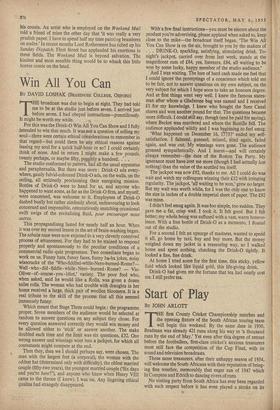Win All You Can
BY DAVID LOSHAK (BRASENOSE COLLEGE, OXFORD) THE broadcast was due to begin at eight. They had told me to be at the studio just before seven. I arrived just before seven. I had obeyed instructions—punctiliously. It might be worth my while.
For this was the Drink-0 Win All You Can Show and I fully intended to win that much. It was not a question of selling my soul—there were certain ethical considerations to remember in that regard—but could there be any ethical reasons against leasing my soul for a quick half-hour or so? I could certainly think of none. And in return I might make a few pounds. twenty perhaps, or maybe fifty, possibly a hundred. .- . .
The studio conformed to pattern, had all the usual apparatus and paraphernalia. But there was more : Drink-0 ads every- where, gaudy fulvid-coloured Drink-0 ads, on the walls, on the ceiling, all stridently proclaiming their energising mission. Bottles of Drink-0 were to hand for us, and anyone who happened to want some, as far as the Drink-0 firm, and myself, were concerned, was welcome to it. Employees of Drink-0 dashed busily but rather aimlessly about, endeavouring to look concerned and responsible, ostentatiously snatching occasional swift swigs of the revitalising fluid, pour encourager nous autres.
This propagandising lasted for nearly half an hour. When it was over my second lesson in the art of brain-washing began. The tabulce rasce were now exposed to a very cleverly contrived process of attunement. For they had to be trained to respond properly and spontaneously to the peculiar conditions of a commercial radio quiz programme. Two comedians began to work on us. Funny hats, funny faces, funny ha-ha jokes, noisy wisecracks of the 'Who-fiddled-while-Nero-burned-Rome?- Well - who - did - fiddle - while - Nero - burned - Rome? — Vic- Oliver - of - course - you - idiot,' variety. The poor fool who, when asked, said he would like a Rolls, was given a dozen toilet rolls. The woman who had trouble with draughts in her home received a large, thick pair of woollen bloomers. It is a real tribute to the skill of the process that all this seemed immensely funny.
Which meant that Stage Three could begin : the programme proper. Seven members of the audience would be selected at random to answer questions on any subject they chose. For every question answered correctly they would win money and be allowed either to 'stick' or answer another. The stake doubled each time and the limit was six questions, £32. One wrong answer and winnings went into a jackpot, for which all contestants might compete at the end.
Then they, then we I should perhaps say, were chosen. The man with the largest feet (a corporal), the woman with the oddest hat (determined only with difficulty), the oldest married couple (fifty-two years), the youngest married couple ('Six days and you're here?'), and anyone who knew when Henry VIII came to the throne (I knew). I was on. Any lingering ethical qualms had strangely disappeared. With a few final instructions—you must be sincere about the product you're advertising, please applaud when asked to, keep close to the mike—the broadcast itself began. 'The Win All You Can Show is on the air, brought to you by the makers of . . . DRINK-O, sparkling, satisfying, stimulating drink. To- night's jackpot, carried over from last week, stands at the magnificent sum of £84, yes, listeners, £84, all waiting to be won by some lucky, happy member of the studio audience.'
And I was waiting. The lure of hard cash made me feel that I could ignore the promptings of a conscience which told me to be fair, not to answer questions on my own subject, on the very subject for which I hope soon to take an honours degree. And at first things went very well. I knew the famous states- man after whom a Gladstone bag was named and I received £1 for my knowledge. I knew who bought the Suez Canal shares and won another pound for that. The questions became more difficult. I could still say, though (and be paid for saying), where Becket was murdered and where the Bastille fell. The audience applauded wildly and I was beginning to feel smug.
'What happened on December 16, 1773?' ended my self- satisfaction. I faltered, guessed, missed, died again, failed again, and was out. My winnings were gone. The audience groaned sympathetically. And I learnt—and will certainly always remember—the date of the Boston Tea Party. My ignorance must have cost me more (though I had actually lost nothing) than the value of the scuttled tea itself.
The jackpot was now £92, thanks to me. All I could do was wait and watch my colleagues winning their £32 with irritating regularity. The jackpot, 'all waiting to be won,' grew no larger. But my wait was worth while, for I was the only one to know the size in inches of a double imperial sheet of paper. The £92 was mine.
I didn't feel smug again. It was too simple, too sudden. They gave me a fat, crisp wad. I took it. It felt good. But I felt better; my whole being was suffused with a vast, warm benevo- lence. With a free bottle of Drink-0 as a memento, I floated out of the studio.
For a second I felt an upsurge of madness, wanted to spetid it all, go home by taxi, buy and buy more. But the money weighed down my jacket in a reassuring way, so I walked home and spent nothing, clutching the Drink-O tightly. It looked a fine, fine drink.
At home I tried some for the first time, this sticky, yellow fluid which looked like liquid gold, this life-giving drink.
Drink-0 had given me the fortune that tea had nearly cost me. I still prefer tea.










































 Previous page
Previous page